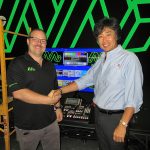Three Industry Pros Define their Role on the Road
Road manager. Tour manager. Sometimes the titles are interchangeable. Above all, it means this: Make your artist happy. And make the show happen. Whatever it takes.
Phil Kaufman, the industry’s legendary road manager for The Flying Burrito Brothers, The Rolling Stones, Joe Cocker and more, defined the job through his exploits in his autobiography, Road Mangler Deluxe. His most famous escapade, featured in the movie, Grand Theft Parsons, recounts the bizarre stealing of country musician Gram Parsons’ body in 1973 and burning it ceremonially at Joshua Tree National Park, per Parsons’ wishes. Apparently, Kaufman had no prior tour managing experience. But it was his client.
That was then. Today’s technology and the professional attitude of our industry has transformed the tour manager role. While it still exudes a glamour — of guiding the rock stars through the daily grind — like any other job, there’s always a devil in the details. But we’re pretty sure it doesn’t involve, uh, body stealing.
Wanting an updated job description of these rulers of the road — and asking what it takes to be successful — we checked in with three well-known tour managers: Jim Runge (who has worked with The Road Mangler himself), David “5-1” Norman and John Callahan.

Jim Runge
Runge’s first tour management gig was 1996/97 with Jimmie Dale Gilmore, opening for Willie Nelson and Emmylou Harris. He recalls that David Anderson, Willie’s tour manager, took him on his first settlement. Emmylou was then tour-managed by Phil ‘The Road Mangler’ Kaufman. Since then, Runge has worked with many artists such as Rickie Lee Jones, The Replacements, Lucinda Williams, Wilco, Ryan Adams, The Black Keys, Empire of the Sun, and, recently, Major Lazer. He will tour with Imagine Dragons in 2017.
A tour manager does “whatever needs to be done,” he explains. “General band needs, tour buck stopper, accountant, babysitter, bus cleaner, life coach, psychologist, guest list.” Every day is different. “It’s getting the band to the venue, general tour business. Guest list. Meet and greets. Make sure needs are covered for the stage and band: food, hotel, bus, stage, dressing room.”
And whatever else it takes to make a show happen, “from dinner reservations to shoveling things out of bus toilets with Solo cups,” he adds. “As far as job descriptions, I don’t really follow one. I might feel demeaned or stupid if I think about it. At the end of the day my job is to keep the artist happy and shows happening.”
While the wild stories must certainly be stockpiled in his memory, Runge says he can’t or won’t discuss them because “In most cases, you can stop ‘wild’ moments by preparing ahead and knowing artist’s needs and desires. I try to avoid drama and situations that may endanger myself or my artist.”
The role hasn’t changed much in his world. “I was a lighting guy, so I come from the days where doubling up was part of it. On some tours there are six people doing the same job I did by myself on another. Every tour is different, with different needs and priorities.”
Best things about the job? “Meeting people I’ve looked up to and becoming friends with some of them.” He adds: “The travel. Eating amazing food around the world. Laughing with my road family. Having relationships with people that others will never know. When you spend 24 hours a day for months with people, you either hate each other or develop a bond like no other. I’m lucky that there aren’t too many people I hate.”
Memorable moments? “Spending time with Willie Nelson on his bus. Having Dan Rather put his arm around me and telling me to drive safely on Election Day 1996 as we celebrated another Clinton victory. Watching Rickie Lee Jones sing Beatles songs on an acoustic guitar at a small cafe in Paris. Seeing the Flatlanders play around a fire at Joe Ely’s house. Exploring small towns in Europe and discovering amazing things.”
While Runge only worked a few tours and one-offs with The Road Mangler, he learned a few things from him, which he offers for those aspiring to the job: ”You’re never bigger than your artist. No matter how big you are you still need to search for work sometimes. Have fun. Respect people you work with, from artists to stagehands to fans,” and finally: “This is one of the few positions that misfits can function in.”
But above all, it’s not just a job. It’s about people. “The people in this business are the best people in the world.”

David “5-1” Norman
David Norman took on the role of tour manager in 1994 with Motown Records group AC Black. Since then, he’s worked with Robert Plant & Alison Krauss, Prince, John Legend, Fall Out Boy, Green Day, John Fogerty, Alicia Keys, TSO, Avicii and a slew of others.
Norman defines his role as: “Babysitter, psychiatrist, banker, problem-solver.” He takes care of all of the logistics: travel, hotels, flights and payroll. He’s also the tour accountant.
He’s noticed the title transform over time. “I remember the days of advancing shows with pen and paper as well as a sky pager. With today’s technology, things are much easier in forms of communication and advance work. I’ve also seen that the role has shifted to doing more double duty: tour manager/tour accountant or tour manager/production manager.”
Details beyond the job description? “Way too much of a loaded question!” But he will share this: “I’ve had to resuscitate the lead singer’s wife, who had overdosed, and then called 911 as I was removing all the contraband off the bus!”
Regarding memorable moments, Norman checked off two bucket list items: seeing the Great Wall of China and visiting the Forbidden City. “On the Alicia Keys tour, we played Dubai, and the promoter had a dinner in the desert for us with belly dancers, falcons. We rode camels. But the highlight for me,” he explains, “was the following day. I asked to be driven into the middle of the desert and meditated for an hour surrounded by nothing but sand and silence. It was one of the most amazing moments ever!”
Wanting to get into tour management? Norman advises to get a mentor and read/learn everything about your craft. “I was lucky to have three amazing mentors who I still confer with to this day — Tom Barfield, Bob Ward and Karen Krattinger — who have all worked with everyone from Prince to Iron Maiden to Beyonce. The knowledge and trust they shared with me was enlightening. Marty Hom and Jerome Crooks have also been huge influences.”
Skills required to be successful at it, he says, include “Being patient, organized, a forward thinker, and be proactive to eliminate bad situations beforehand. Above all: it’s not about you, it’s about the artist and the fans. It’s your job to be a facilitator to make people happy, and to feel safe and well taken care of.” Finally, he adds, say thank you to everyone. “Small words mean a lot!”
John Callahan
John Callahan transitioned from stage manager to tour manager in 1977 with the James Montgomery Band in Boston. He also worked indirectly with hundreds of acts as the operations manager at Mountain Productions from 1984-1995.
Over the years, he’s tour managed The Cars, Bonnie Raitt, The Band, JJ Cale, The Beach Boys and Cyndi Lauper, among others. He’s been with Tony Bennett since 2012. In his “off” time, he’s also been the site logistics coordinator for the Presidential Debates (since 2000).
Callahan defines his role as “Head chef and bottle washer — anything within reason for the artist, band and crew.” He enjoys the daily logistical challenges of putting together a successful show, and wears no other “hats” as is typical of tours today. “The acts I am fortunate enough to work with understand the value and scope of my work.”
Being tour manager means being “on” when everyone else is “off.” On a past tour in Texas, while the crew enjoyed a night on the town, Callahan was checking out a jazz club — Tony had expressed interest in popping into the venue after his show the next night. Callahan did his site-surveying, talking with the owner to ensure the artist’s privacy at a dark corner table. He checked out the path from the door, looking for stair steps or any obstacles. Just one of the many things a tour manager does to take care of their artist.
Sometimes the situation involves a catastrophe. Callahan was in Japan with Cyndi Lauper’s tour when the 9.1 magnitude earthquake and devastating tsunami hit in 2011. “That was a challenge, re-sorting schedules/logistics while other bands touring in the country cancelled shows. We were the only act that stayed, and Cyndi became the darling of Japan after that.”
Other out-of-the-ordinary situations involve flying in a cargo plane with gear, getting the crew through customs after a night of partying in Europe, doing 48-to-72-hour days on site builds, and so on.
But for an enduring icon such as Tony Bennett, routine duties rise to another level. Callahan may find himself riding a freight elevator with Barbra Streisand. Or meeting Prince Charles at Buckingham Palace. Confirming passes for VIP guests usually means your VIPs are as famous as Tony. When the fans’ meet-and-greet line to talk to Tony includes The Beach Boys’ Mike Love and Al Jardine, for example, it’s still just part of the job. But the cool factor kicks in.
“Places I’ve been, you pinch yourself, you ask, am I really here? Especially with Tony. You meet the coolest people. With Tony, it’s highlights all the time. It’s a different gig with Tony because of who he is, the level of the shows, the audiences — we see four generations of people. People still enjoy Tony Bennett after all these years. Everybody loves the guy and he loves them right back. Tony is going to go on forever.”
He’s enjoyed his tour manager role for “the satisfaction of being able to travel the world, meeting many wonderful people and at the end of the day enjoying how so many people go away with a great experience.”
His advice to newbies wanting to get into tour management? “The same guidelines apply today as when I, and many of us ‘old guys’ started out: Be willing to do anything at any time, without an attitude, for the good of the cause. Seek the best mentors. I thank John Conk, Al Dotoli and Joe Baptista (RIP) for their help when I was a kid hanging out at load-ins asking to help where I could. (Those opportunities are not as available nowadays.) Finally, never assume and have a Plan B, C and D ready when Plan A falls apart.”



